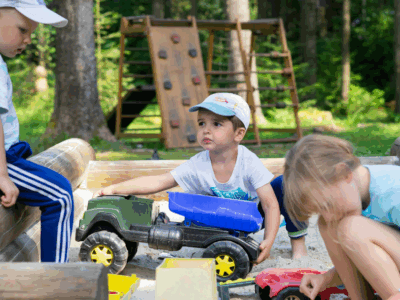At sixteen months old, your child has now mastered receptive language. They probably understand nearly everything they are told. Whether or not your toddler actually listens to you is a different story! By this age, you may also notice your little one become clingy again, after they just spent the last year gaining independence. This is totally normal and to be expected at this age. Your baby has had so many new developments over the past few months that they are bound to feel overwhelmed from time to time!
At sixteen months of age, your baby may…
Feel embarrassed. Embarrassment is likely a new emotion for your toddler. If she falls or does something clumsy, she might look up in shock to see who was watching. Big reactions from adults may cause her to feel embarrassed for the first time. Crying from a fall might be due to this new feeling more than the pain from the accident itself!
Follow two step directions. Before now, your baby was only able to follow one direction at a time. But now, two step directions will become easier for him to accomplish. You can say something such as “pick up the ball and close the door,” and he will probably be able to complete both tasks while you watch in wonder at his newest receptive skills!
Start a new schedule. Sixteen months is a common time for your little one to drop down to a single nap each day. If your baby was already taking one nap a day, you might notice that sleep time become a little bit shorter. Toddlers need more than 12 hours of sleep in a 24 hour period. If your kiddo has dropped down to one nap, make sure they are making up for it with more sleep at night. Now is the perfect time to transition to a slightly earlier bedtime.
Draw a line. What used to be just scribbles, now starts to look like actual drawing. Your sixteen month old may be able to hold a pencil or crayon and draw a relatively straight line on her own! Show her how you do it first, and then watch to see if she can copy you on the paper.
Undress. It may start with just socks and shoes, but eventually your toddler will be able to undress himself. This can be both amazing and scary, because soon enough your child will be able to remove his own pants and diaper as well! If this does become an issue, try to use zip up pajamas for nap and nights, since they are a little trickier to navigate when you have small, chubby fingers.
Dance to music. Many babies start to react to music at a very young age. However, by 16 months, your child is most likely dancing up a storm anytime she hears a song! You can expect some wild dance moves as your little one begins to understand the basics of rhythm and movement on her strong, steady legs and feet.
Act distracted. For the last few months, your child has been steadily increasing his attention span. But around this time, you might notice that he seems to have less patience, not more! This is very common, and just another little quirk of toddlerhood. As your baby becomes more mobile and aware, they are excited to learn. They want to touch, look at, listen to, taste, and smell any new thing. This often leads to more distraction and a shorter than before attention span.
Break out of the crib. It will probably happen earlier than you think… that one secure place of refuge and sleep has suddenly become a climbing structure. At sixteen months old, it is entirely possible that your toddler will learn to outclimb her crib!
Sort things by color. By now, your little one knows at least a few colors. She may even be able to sort items by color, such as blocks or toy cars. If you ask for your toddler to hand you an item of a certain color, chances are she will be able to do this at around sixteen months.
Right now, your child really needs your warmth, attention, and focus. Sixteen months is a big time of perceptual transition, and as new emotions continue to evolve and develop, so will tantrums, distractions, and separation anxiety. Since this is a peak time in toddler sensitivity, try to be aware of your child’s emotional needs before they occur. You can help them navigate daily transitions with support and comfort. Luckily, your child is maturing and gaining new language skills at every moment, so overall communication will improve drastically in the coming months!



